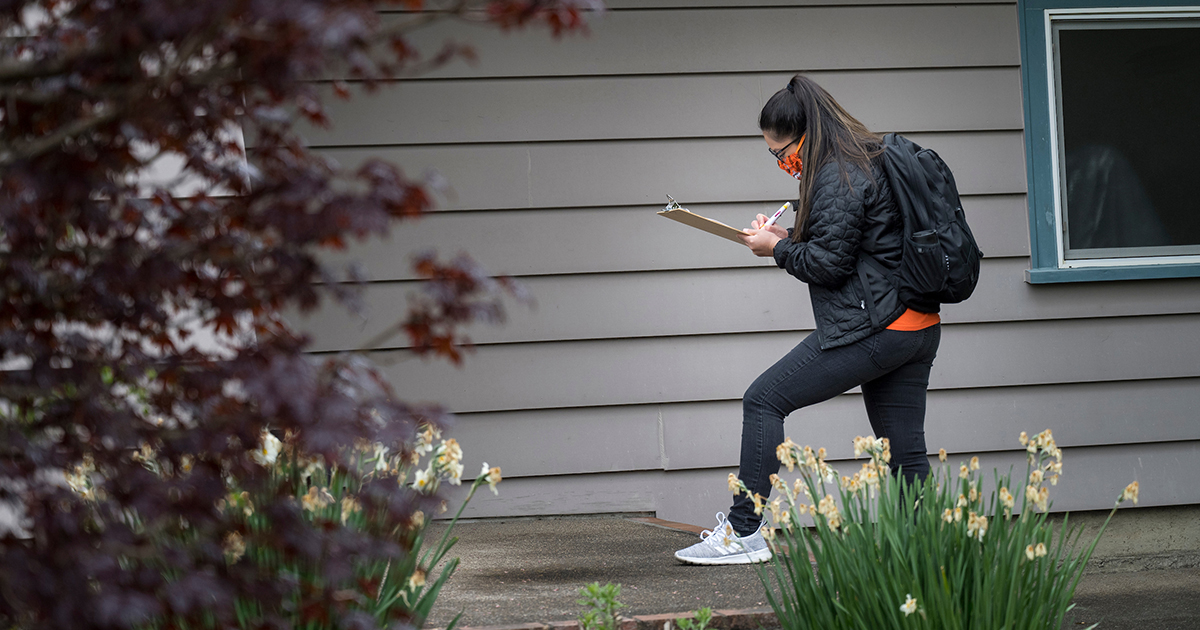
Oregon State University will conduct a fifth round of door-to-door sampling in Corvallis this weekend on Sept. 12 and 13 for the novel coronavirus that causes COVID-19.
The public health surveillance project, Team-based Rapid Assessment of Community-Level Coronavirus Epidemics, known as TRACE-COVID-19, began in Corvallis in late April, continued the subsequent two weekends and included a weekend of sampling in mid-June. In all, more than 2,000 people in Corvallis have been tested through TRACE.
The door-to-door sampling was postponed until Sept. 26 and 27 due to hazardous air quality in the Corvallis area, caused by numerous wildfires in the Pacific Northwest.
The latest round of sampling will conclude five days before OSU students living in on-campus housing begin moving in, and 10 days before fall term classes begin.
Also on Sept. 11-12, TRACE researchers with the OSU College of Engineering will take wastewater samples in Corvallis to analyze for genetic signals of SARS-CoV-2, the virus behind COVID-19. OSU researchers have conducted weekly testing of Corvallis community wastewater since May. Genetic evidence of the virus consistently has been detected at moderate levels for the past month following a late July spike, according to Oregon State researchers.
“Benton County Health Department is extremely fortunate to have OSU’s energetic and inspired researchers as our partners,” says Charlie Fautin, the department’s interim co-director. “This study continues to provide valuable and timely information about the virus’ current presence.”
In announcing prevalence results, the TRACE team follows reporting policies used by the Oregon Health Authority and local health departments by not announcing numbers of positive cases between one and nine. Doing so may contribute to identifying an actual community member who tested positive, says Ben Dalziel, an assistant professor in OSU’s College of Science and the project leader.
“It is important that everyone continue to follow the advice of public health officials regarding face masks, hand-washing and other sanitizing methods, and social distancing,” says Jeff Bethel, an associate professor in OSU’s College of Public Health and Human Sciences and part of the TRACE leadership team. “All evidence suggests that SARS-CoV-2, the virus causing COVID-19, is highly contagious. The larger the gathering, the greater the likelihood that you will encounter an infected individual, regardless of whether they show symptoms.”
How TRACE sampling works
At each home visited by TRACE field workers this weekend, members of the household will be invited to participate in the study. Those who choose to take part are asked to provide information such as their name and date of birth; fill out a simple consent form; and answer a few confidential, health-related questions.
Participants will be given a nasal-swab test kit that they administer to themselves inside their home and to their minor children if they want them to take part. The field staff will wait outside, and the participants will leave the completed test kits outside their front door.
Field staff will maintain a safe distance at all times and will not enter anyone’s home. The safety of participants and TRACE field staff is a key part of the project’s design.
The tests used in TRACE-COVID-19 collect material from the entrance of the nose and are more comfortable and less invasive than the tests that collect secretions from the throat and the back of the nose.
The field workers will leave participants with information about the project and how they will receive their results – available in seven to 10 days – as well as health guidance from the Benton County Health Department and the Centers for Disease Control and Prevention. Participants in the effort will receive their results and those of their minor children by secure e-mail with receipt by United Parcel Service delivery as a backup. Everyone’s personal information will be safeguarded.
“It’s important to remember that COVID-19 is still with us, even though Benton County communities have been successful in limiting the spread,” Charlie says. “Our hope is that the information from this latest round of testing will provide additional information our communities need to continue to reduce the impacts of this ongoing pandemic.”
The TRACE project is a collaboration of five OSU colleges – Science, Agricultural Sciences, the Carlson College of Veterinary Medicine, Engineering, and Public Health and Human Sciences – plus the OSU Center for Genome Research and Biocomputing. The project works in partnership with the Benton County Health Department in Corvallis and other county health departments around the state.
The diagnostic testing component of TRACE operates through a partnership between the Oregon Veterinary Diagnostic Laboratory, which is located at OSU, and Willamette Valley Toxicology.
The public health surveillance project has received funding from OSU, the David and Lucile Packard Foundation, PacificSource Health Plans and the Oregon Health Authority and has been aided by work from the OSU Foundation and the OSU Alumni Association.
For more information about TRACE, visit the TRACE-COVID-19 website. The site includes a list of frequently asked questions.
COVID-19 was first reported to the World Health Organization on Dec. 31, 2019. In Oregon, there have been 26,988 positive tests for SARS-CoV-2 and 563,144 negative tests, according to the Oregon Health Authority. The OHA attributes 486 deaths to the virus.
In Benton County, there have been 204 confirmed cases and six deaths, according to the county health department.